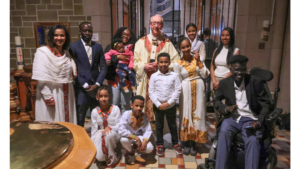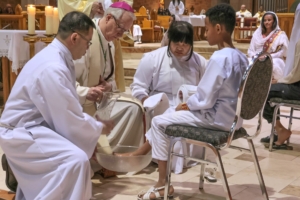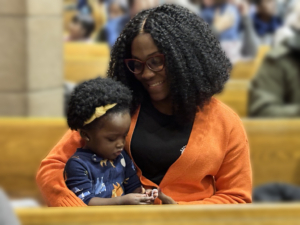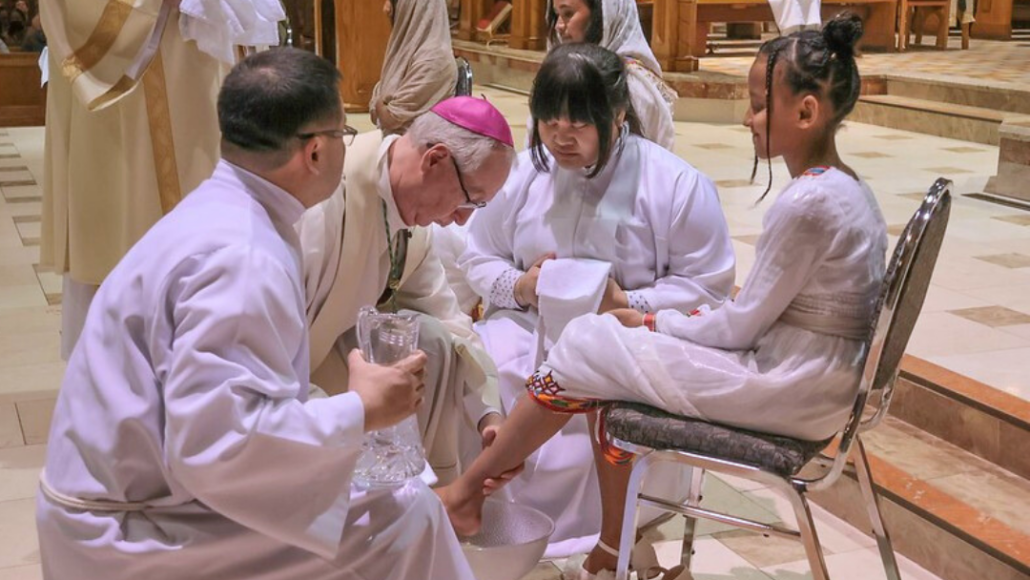In a ritual of humility and fraternity, Archbishop Richard Smith washed the feet of 12 Catholic Social Services community members, including refugees and immigrants who have settled in the Edmonton area with the support of CSS.
“It has been a humbling experience. For me, I can say that [this act of washing the feet] demonstrates that in the love of Jesus, we are all the same,” said Majok Lam Thoan, who arrived in Canada as a refugee from Sudan in July 2022.
“It’s really good; it will be a good memory that will stay with me forever. Because I have never known a bishop or an archbishop or a cardinal or even a priest to wash my feet. It is a good example for all of us!”

According to the Gospel, the Holy Thursday ritual echoes the selfless love of Jesus Himself, who washed the feet of the Twelve Apostles at the Last Supper on the night before His Crucifixion. The foot washing stands as a call for all Christians to follow the example of Christ and live lives of humble service.
The Holy Thursday Mass and Washing of the Feet occur every year. However, this is the first time that individuals who are a part of the Catholic Social Services community participated in this ritual.
Archbishop Smith also met privately with the 12 participants prior to Mass. Among them were seven individuals from Eritrea, two from Ukraine, two from Nigeria and Lam Thoan, who is from Sudan.

“I came originally from South Sudan, in east Africa. But I fled my country when there was a civil war, almost a decade ago,” Lam said. “I became a refugee. And I moved between countries and spent a long time in refugee camps, before coming to Canada.”
Lam is one of approximately 1,300 government-assisted refugees that settled in Alberta in 2022 with the help of Catholic Social Services. He now works as an interpreter for CSS, to aid in the welcoming and settlement of incoming refugees and immigrants.
Holy Thursday marks the beginning of the Paschal Triduum, a period of three days that follows the Passion, Death and Resurrection of our Lord Jesus. Holy Thursday marks the celebration of the Last Supper.
Traditionally, the main celebrant for Holy Thursday Mass washes the feet of 12 individuals during the Mass, as a sign of his commitment to follow in the steps of Jesus and to serve with humility and love.

Throughout his Papacy, Pope Francis has made a tradition of washing the feet of both men and women and washing the feet of those in difficult circumstances, including refugees and inmates. This year, he washed the feet of 12 female inmates at Rome’s Rebibbia prison.
Archbishop Smith spoke of the significance of the Washing of the Feet ritual during his homily at St. Joseph’s Basilica.
“How can we not be overwhelmed with gratitude for what God has done for us in the gift of His Son? How can we not want to give back? This is precisely what we do when, moved by both gratitude and charity, we ‘wash the feet’ of others, that is to say, give of ourselves in service to anyone in need,” Archbishop Smith said.

“This evening, then, as we now wash the feet of those who have found asylum with us [in Canada] may the love of Christ renew us in our desire and zeal to serve anyone seeking refuge from the challenges and difficulties of this world. May our love in action draw them to the one true and sure asylum: the love of Christ poured forth anew in every celebration of the Eucharist.”
Assumpta Osuizugbe moved to Canada from Nigeria in October 2022, along with her husband and daughter, Gianna, who was born several months after their arrival in Canada. Assumpta shared her gratitude – and surprise – at being invited to participate in the washing of the feet ritual.
“So back home [in Nigeria], the washing of the feet is meant for elders [and seniors] in the church. That’s what I grew up with. So I was surprised when I was sent an email to be among those whose feet will be washed. . . I think it’s going be my memory for a very long time. I loved it.”

Assumpta also emphasized that for her the foot-washing ritual is one that symbolizes new life.
“The symbolic meaning for me is that Christ is washing away [my] sin and [making me] brand new. Christ is telling [us] to go into the world and do the same to others as well. Not necessarily washing people’s feet, like the Archbishop [literally] did today. But going out and helping people in need and being a helping hand in every possible way.”
For Assumpta, Catholic Social Services has been that helping hand to her, as she has wrestled through the process of immigration and settling in a new country, far away from most of her family and friends in Nigeria.
“I am so blessed to have found Catholic Social Services, and [specifically] Gianna Center. That was part of the reason why I named my baby Gianna, because what they did for me was a transformation. I came here and Gianna Centre helped me integrate, because I was pregnant. They took care of me, they got me my first bed. And all of these are miracles that I hold really high.”

The witness of Christian service that CSS has offered to Assumpta has ushered her into not only a new country, but a community and family.
“I want to always remember how CSS came through for me and always tell my story to every new immigrant. Catholic Social Services has been amazing to me, and I’m proud to be part of [this community].”
“It was an honour for people served by CSS to be invited to participate in the foot-washing rite at the Basilica’s Holy Thursday Mass with Archbishop Smith,” said Dr. Troy Davies, CEO of Catholic Social Services.
He added, “In light of the Cross, and as so powerfully expressed by the foot-washing ceremony, genuine Christian love involves an act of self-gift, a giving of oneself in service, for the sake of another. It’s love all the way to the end! So, the rite was a beautiful way to be reminded that CSS is truly a part of Christ’s mystical Body, which will always entail a call to serve others in a spirit of generosity, hospitality and humility.”

Holy Thursday also marks the day upon which Christ instituted the Sacrament of the Eucharist. During his homily, Archbishop Smith reflected on the Eucharist and how not only does Christ offer the ultimate asylum for literal refugees, but for all people who seek asylum amid the suffering of life.
“Where can we flee for refuge from [the challenges of life]? Where are we truly safe? Our refuge is the Most Holy Eucharist. Jesus himself is our refuge, and he makes himself present – truly, really present – in the sacrament of the Most Holy Eucharist.” shared Archbishop Smith.
“When we receive into ourselves [the Eucharist] . . . we are given Holy Communion with the Lord Jesus, who is our sanctuary and protection from all that threatens us.”
Read Archbishop Smith’s full homily from the Easter Vigil.
To hear more stories about the Catholic faith coming alive in the Archdiocese of Edmonton, subscribe to our weekly newsletter, The Window.
Jenny Connelly – Archdiocese of Edmonton

